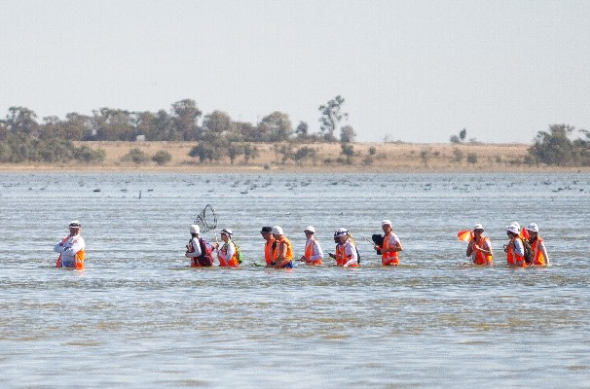Public safety on wetlands

The GMA and other Authorised Officers including Victoria Police regularly monitor Victorian wetlands to ensure compliance with duck hunting and public safety laws.
Lawful protesting
These offence provisions do not prevent people from protesting in a safe and lawful manner. People may protest as long as they don’t enter or remain in the waters of any specified hunting area during specified times. They may enter wetlands after specified times have ceased, but still cannot hinder, harass, interfere with, or obstruct hunters at any time.
Offences
There are three main offence themes under the Wildlife Act 1975 that are designed to prevent potentially dangerous interactions between hunters and protesters on wetlands.
These restrictions have been designed to address safety issues while imposing minimal impacts on all wetland users.
Some examples of offences under the Wildlife Act 1975 are listed below.
During a duck hunting season, only people who hold a valid Game Licence endorsed for duck hunting and a valid Firearms Licence can enter specified hunting areas during specified times.
Specified hunting areas:
- the waters of any State Game Reserve and the land within 25 metres of the water shoreline of those waters;
- the waters of the hunting areas described in Schedule 8 of the Wildlife (Game) Regulations 2024 and the land within 25 metres of the water shoreline of those waters.
Specified times are:
- From midnight of the first day of duck season until 11 a.m. of that day.
- From 2 hours before sunset of the first five days of the duck season (including the first day) until 11 a.m. of the following day
- For the remainder of the season, from 2 hours before sunset of each day of duck season (including the first day) until 10 a.m. of the following day.
- From 2 hours before sunset of the last day of the duck season until 30 minutes after sunset of that day.
The maximum penalties for entering a wetland without authorisation is 60 penalty units.
During a duck hunting season, it is an offence to approach within 10 metres of a person who is carrying a firearm or hunting game birds in a specified hunting area.
This does not apply to people hunting together or people that are supervising hunters.
The maximum penalties for interfering with hunting is 60 penalty units.
It is an offence for anyone to hinder, harass, interfere with, or obstruct a person engaged in hunting at any location and time. Examples of this illegal behaviour include, but are not limited to:
- Preventing hunters from taking a shot by standing or remaining within their firing line.
- Using sounds or visual instruments to intentionally scare birds away from hunters or change their natural flight patterns.
- Standing or remaining within or close to a hunters decoy spread to prevent birds from landing.
- Preventing or impeding a hunter from retrieving a downed bird.
- Interfering with or touching a gundog.
The maximum penalties for interfering with hunting is 60 penalty units.
It is an offence to be in possession of game without a valid Game Licence or authority. However, there is an exemption if a person temporarily possesses injured game for the purpose of transporting it to a registered veterinary practitioner.
The maximum penalties for being in illegal possession of game is 50 penalty units.
Enforcement Actions
Game Officers have a range of different enforcement options to take action against offenders and to encourage compliance.
A Banning Notice prohibits an alleged offender from entering or remaining in a specified hunting area or areas for the period specified in the notice.
Authorised Officers and the Victoria Police can issue a banning notice to a person they suspect on reasonable grounds is committing or has committed any of the above public safety offences.
The length of the Banning Notice is at the discretion of the Authorised Officer or police member. However, it cannot extend beyond the length of the duck season in which it was issued.
It is an offence to breach a Banning Notice. The penalty is a maximum of 20 penalty units for a first offence and a maximum of 60 penalty units for a second or subsequent offence.
An Exclusion Order is a court order that prohibits a person from entering any or all of the specified hunting areas for a period of up to 12 months. The courts can impose an Exclusion Order if a person is found guilty of committing a specified offence (i.e. one of the three public safety laws).
It is an offence to breach an Exclusion Order. The penalty is a maximum of 60 penalty units for a first offence and up to 120 penalty units for a second or subsequent offence.
Authorised Officers and the Victoria Police can issue an infringement to a person who is detected committing or has committed any of the above public safety offences.
When an illegal public safety offence is detected and there is sufficient evidence to proceed, the GMA may seek court prosecution. To commence a prosecution, the GMA must ensure that there is a reasonable prospect of a conviction, which involves meeting the burden of proof, and that a prosecution is in the public interest.
Visit Enforcement Actions for more information and the process of how to seek a review of these actions.
Page last updated: 26 Feb 2025